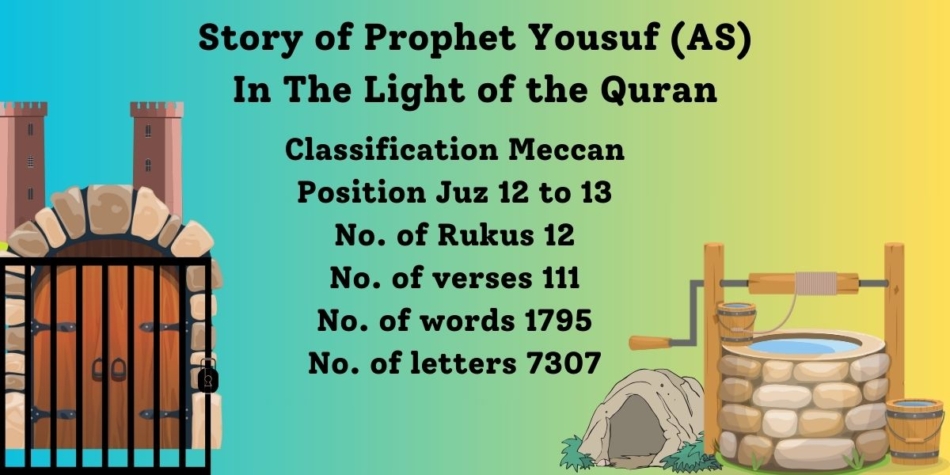A Tapestry of Hope: Unveiling the Moral Lessons Woven in the Story of Prophet Yusuf (AS)
أَنْتَ وَلِيِّي فِي الدُّنْيَا وَالْآخِرَةِ ۖ تَوَفَّنِي مُسْلِمًا وَأَلْحِقْنِي بِالصَّالِحِينَ
You are my protector in this world and in the Hereafter. Cause me to die a Muslim and join me with the righteous.
Surah Yousuf > (12:101)
The story of Prophet Yousuf (Joseph), peace be upon him, is a profound tale of resilience, patience, and divine wisdom. It is narrated in the Quran, primarily in Surah Yusuf (Chapter 12), and is one of the most detailed narratives in the holy book.
Prophet Yousuf, the son of Prophet Ya’qub (Jacob), was blessed with exceptional beauty and wisdom from a young age. His father loved him dearly, which aroused jealousy among his older brothers. Their envy reached such a point that they hatched a plan to get rid of him. They convinced their father to allow Yousuf to accompany them on a journey, where they threw him into a well, leaving him for dead. However, instead of facing death, Yousuf was rescued by a passing caravan and taken to Egypt.
In Egypt, Yousuf was sold as a slave to a high-ranking official named Potiphar. Despite the hardships he faced, he remained steadfast in his faith and displayed exemplary character. His integrity and charm caught the attention of Potiphar’s wife, who tried to seduce him. Yousuf, however, resisted her advances, choosing righteousness over sin. Enraged by his rejection, she accused him of wrongdoing, leading to his imprisonment.
Even in prison, Yousuf’s story took a positive turn. He interpreted the dreams of his fellow inmates, which eventually reached the ears of the king. One of the inmates, upon release, informed the king of Yousuf’s gift of dream interpretation. Intrigued, the king summoned Yousuf and presented him with a dream that had baffled his wise men. Yousuf not only interpreted the dream accurately but also foretold a severe famine that would strike the land. Impressed by his wisdom, the king appointed Yousuf as the administrator of Egypt’s food reserves.
As the famine swept across the region, Yousuf’s brothers traveled to Egypt seeking provisions. Unaware of his survival and his elevated status, they found themselves standing before Yousuf, who recognized them instantly. Yousuf tested their sincerity by concealing his identity and demanding that they bring their youngest brother, Benjamin, to prove their honesty.
Eventually, the truth came to light, and Yousuf revealed his identity to his astonished brothers. Overwhelmed with guilt and remorse, they sought his forgiveness, and Yousuf responded with compassion, saying, “No blame will there be upon you today. Allah will forgive you, and He is the most merciful of the merciful.”
The story of Prophet Yousuf (AS) imparts numerous moral lessons. One of the primary lessons is the importance of patience and perseverance in the face of adversity. Yousuf faced betrayal, false accusations, and imprisonment, yet he remained steadfast in his faith and trust in Allah’s plan. His resilience eventually led him to a position of power and influence.
Another crucial lesson is the significance of morality and integrity. Yousuf’s unwavering commitment to righteousness, even in the face of temptation, showcases the importance of moral values. His refusal to succumb to the advances of Potiphar’s wife reflects the strength of character that believers should strive to maintain.
The story also highlights the theme of forgiveness. Despite the severe hardships inflicted upon him by his brothers, Yousuf forgave them wholeheartedly when the truth was revealed. This forgiveness and compassion demonstrate the noble qualities of mercy and magnanimity, encouraging believers to forgive others and seek reconciliation.
Additionally, the narrative underscores the concept of divine wisdom and providence. Yousuf’s journey from being a beloved son to a slave, a prisoner, and eventually a ruler, reflects the intricate tapestry of Allah’s plan. It teaches believers to trust in Allah’s wisdom, even when facing seemingly insurmountable challenges.
In essence, the story of Prophet Yousuf (AS) serves as a timeless source of inspiration, offering profound insights into the virtues of patience, morality, forgiveness, and trust in Allah’s divine plan.

The story of Prophet Yusuf (Joseph) in the Quran is rich with lessons and wisdom. Here are some key takeaways:
- Resilience and Patience: Yusuf faced numerous trials, including betrayal by his brothers and imprisonment. His patience and resilience in the face of adversity teach us the importance of perseverance.
- Trust in Allah’s plan: Throughout his challenges, Yusuf maintained his trust in Allah. The story emphasizes the significance of relying on God during difficult times and trusting in His ultimate plan.
- The Consequences of Jealousy: The envy of Yusuf’s brothers led to their harmful actions. The story warns against the destructive nature of jealousy and the importance of fostering goodwill and brotherhood.
- Forgiveness: Despite the injustices he endured, Yusuf forgave his brothers when they sought his forgiveness. The narrative highlights the virtue of forgiveness and letting go of resentment.
- Divine Wisdom: The twists and turns in Yusuf’s life reveal a divine plan beyond human comprehension. It underscores the belief in God’s wisdom, even when events seem inexplicable.
- Dream Interpretation: Yusuf’s skill in interpreting dreams showcases the importance of using one’s talents for the benefit of others.
- Forgiveness and Compassion: Yousuf forgave his brothers, illustrating the virtues of forgiveness and compassion.
- Faithfulness and Loyalty: Yousuf’s loyalty to his principles, even in difficult circumstances, emphasizes the value of faithfulness.
In essence, the story of Yusuf emphasizes virtues such as patience, trust in God, forgiveness, and the understanding of divine wisdom in life’s unfolding events.











